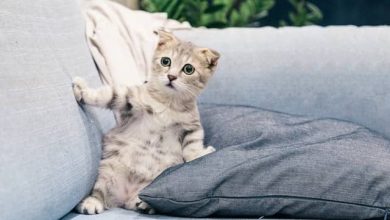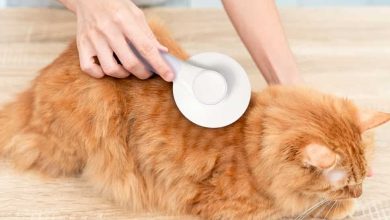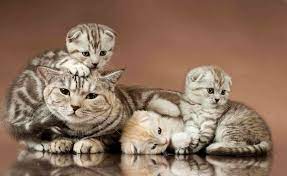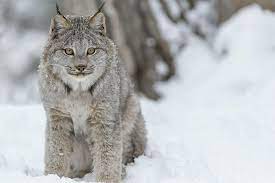Why Is My Cat Grooming My Hair
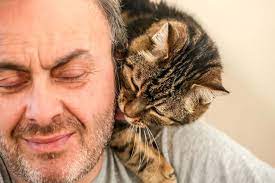

Have you ever wondered why your cat takes an interest in grooming your hair? It may seem unusual at first, but there are several reasons behind this behavior. Cats are fascinating creatures with unique behaviors, and grooming, whether self-directed or directed towards others, plays a crucial role in their lives. In this article, we will explore the reasons why cats groom human hair and what it signifies in their feline world.
Understanding Cat Grooming Behavior
Innate grooming instincts
Grooming is an innate behavior in cats that starts from a young age. Mother cats groom their kittens to keep them clean and stimulate their blood circulation. As kittens grow, they develop grooming habits to maintain their own hygiene.
Role of grooming in maintaining hygiene
Cats are known for their cleanliness, and grooming is a vital part of their daily routine. By licking their fur, cats remove dirt, debris, and excess oil, keeping their coat healthy and free from parasites.
Grooming as a form of self-soothing
Grooming also serves as a self-soothing mechanism for cats. The repetitive motion of licking releases endorphins, which help them relax and alleviate stress or anxiety.
Hair Grooming: The Cat’s Perspective
How cats perceive human hair
Cats have highly sensitive senses, including a keen sense of smell. Human hair carries various scents that can pique their curiosity. The texture of hair also differs from their own fur, making it intriguing to explore.
Fascination with hair texture and scent
The unique texture of human hair, combined with its distinctive smell, can captivate a cat’s attention. They may find it interesting to run their paws through your hair, nibble gently, or even lick it.
Role of grooming in scent marking
Cats have scent glands on their paws and around their mouths. When they groom your hair, they leave their scent behind, marking you as part of their territory. This behavior is an expression of ownership and affection.
Reasons Why Cats Groom Human Hair
Expression of affection and trust
Grooming your hair can be seen as a gesture of affection and trust from your cat. Cats often groom those they feel close to, and by grooming your hair, they are displaying their fondness for you.
Seeking attention and companionship
Cats are social animals that crave interaction and companionship. By grooming your hair, they are seeking your attention and reinforcing the bond between you. It’s their way of saying, “I enjoy your company.”
Association of human hair with comfort
Cats find comfort in snuggling up against warm and soft surfaces. Your hair, with its warmth and familiar scent, can provide them with a cozy and comforting experience. Grooming your hair may be their way of finding solace and relaxation.
Benefits of Cats Grooming Human Hair
Strengthening the human-cat bond
When your cat grooms your hair, it deepens the bond between you. This shared grooming experience creates a sense of intimacy and mutual trust, enhancing your relationship with your feline companion.
Enhanced relaxation for both parties
Grooming can have a soothing effect on both the cat and the person being groomed. The gentle strokes and rhythmic motions promote relaxation and can be a calming activity for both of you.
Potential stress reduction for the cat
Engaging in grooming behaviors can help alleviate stress in cats. By grooming your hair, they may find comfort and reassurance, reducing anxiety and promoting overall well-being.
How to Respond to Cat Hair Grooming
Ensuring a clean and healthy scalp
While cat hair grooming can be a pleasant experience, it’s essential to maintain a clean and healthy scalp. Regularly wash your hair and keep it free from excessive oils or residues to prevent any discomfort for your cat.
Setting boundaries and redirection techniques
If you find your cat’s hair grooming becoming excessive or uncomfortable, it’s essential to set boundaries. Redirect their attention to appropriate toys or scratching posts when you feel they are crossing those boundaries.
See also: Pet Hair Cutting: Tips, Tools, and Techniques for a Perfect Grooming
Using positive reinforcement for desired behavior
Positive reinforcement is a powerful tool in shaping your cat’s behavior. Whenever your cat displays appropriate grooming behavior, reward them with praise, treats, or gentle affection. This will encourage them to continue engaging in desirable grooming habits.
When Cat Hair Grooming Becomes Excessive
Possible causes of over-grooming
While occasional hair grooming is normal, excessive grooming can be a sign of underlying issues. It could indicate skin allergies, parasites, or even stress-related conditions. Monitor your cat’s grooming habits and consult a veterinarian if you notice any concerning patterns.
Seeking veterinary advice for underlying issues
If your cat’s hair grooming becomes compulsive or leads to bald spots, it’s crucial to seek professional advice. A veterinarian can help identify and address any underlying medical conditions contributing to the excessive grooming behavior.
Providing alternative outlets for grooming needs
To prevent excessive hair grooming, provide your cat with appropriate outlets for their grooming needs. Regular brushing sessions can help minimize shedding and give them a satisfying grooming experience while strengthening the bond between you.
Tips for a Harmonious Grooming Experience
Regular brushing to minimize shedding
Brushing your cat’s fur regularly not only helps reduce shedding but also promotes a healthy coat. It removes loose hair, prevents matting, and can be a bonding activity for both of you.
Maintaining proper hygiene for your cat
While cats groom themselves, they may benefit from occasional assistance in hard-to-reach areas. Gently wiping their fur with a damp cloth or using pet-safe grooming wipes can help keep them clean and comfortable.
Creating a relaxing environment for grooming
Make the grooming experience enjoyable by creating a calm and soothing environment. Choose a quiet and comfortable space, use gentle and reassuring tones, and offer treats or rewards to create positive associations with the grooming process.
Common Myths and Misconceptions about Cat Grooming
Cats grooming as a sign of illness
Contrary to popular belief, cats grooming themselves or others is not always a sign of illness. It is a natural behavior that helps them maintain cleanliness and comfort. However, if you notice significant changes in grooming habits, such as excessive grooming or bald patches, it’s advisable to consult a veterinarian.
Link between excessive grooming and allergies
Excessive grooming can sometimes be a sign of allergies in cats. However, it’s important to consider other factors and consult a veterinarian to determine the underlying cause accurately. Allergies can have various symptoms, and proper diagnosis is crucial for appropriate treatment.
Differentiating between grooming and play biting
Occasionally, cats may groom your hair in a playful manner that involves gentle nibbling or biting. It’s essential to distinguish between grooming and play biting to ensure a positive and safe interaction. If your cat’s behavior becomes too rough or uncomfortable, redirect their attention to appropriate toys.
Conclusion
Cats grooming human hair is a unique behavior that stems from their innate instincts, their desire for companionship, and their need for comfort. When your cat grooms your hair, it is a display of affection, trust, and a way of strengthening your bond. While maintaining proper hygiene and setting boundaries, embrace this endearing behavior as a sign of your cat’s love and connection.
FAQs about Why Is My Cat Grooming My Hair
Why does my cat groom my hair when I’m sleeping?
Cats may groom your hair while you’re sleeping as a way of seeking comfort and expressing their affection. Your scent and warmth provide a soothing experience for them.
Is it safe for cats to ingest human hair?
Ingesting small amounts of human hair is generally not harmful to cats. However, it’s best to prevent them from ingesting large amounts, as it can lead to gastrointestinal issues or hairballs.
Can excessive cat hair grooming cause bald spots?
Excessive grooming can lead to bald spots in cats due to hair loss from repeated licking. If you notice significant hair loss or bald patches, it’s advisable to consult a veterinarian to rule out any underlying health issues.
See also: I Groomed (Trimmed) my Jack Russell Terrier At Home
How often should I brush my cat’s fur?
The frequency of brushing depends on your cat’s breed and coat length. Generally, long-haired cats may require daily brushing, while short-haired cats may benefit from brushing a few times a week to minimize shedding and maintain a healthy coat.
Should I be concerned if my cat stops grooming my hair?
If your cat suddenly stops grooming your hair, it may indicate a change in their behavior or preferences. However, it’s not necessarily a cause for concern unless accompanied by other significant changes in their overall grooming habits or behavior.

